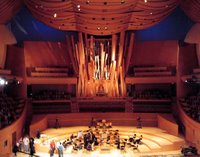Live symphony concerts available as downloads
 Two programs from the Los Angeles Philharmonic's hip "Minimalist Jukebox" series, performed this weekend, are scheduled for release through DG Concerts and iTunes on April 4. Although pricing is not final, each live concert will probably cost about $10 to download, less for complete individual works.
Two programs from the Los Angeles Philharmonic's hip "Minimalist Jukebox" series, performed this weekend, are scheduled for release through DG Concerts and iTunes on April 4. Although pricing is not final, each live concert will probably cost about $10 to download, less for complete individual works.Both orchestras are part of a new initiative by the Universal Music Group built on its Deutsche Grammophon and Decca labels. DG Concerts and Decca Concerts will, between them, ultimately service about 10 orchestras in the United States and abroad. Negotiations are under way with orchestras in London, Paris and three German cities. The current intention is for each orchestra to offer, on average, four concerts a season for digital downloading, and one of the four would also be released on CD.
The New York Philharmonic, in its three-year project with DG Concerts, is taking a financial gamble in the hope of reaching a worldwide audience. As part of the contract, the Philharmonic members chose a percentage of royalties rather than their usual flat fee up front. The recordings remain the property of the Philharmonic, which has licensed them to Deutsche Grammophon.
"For us, it's all about getting a foothold in the new media," said the violinist Fiona Simon, the chairwoman of the orchestra committee that helped negotiate the deal. "Downloading is probably the way that classical music is going to be distributed in the future. The CD isn't dead yet, but it's fading."
The orchestras involved in the Universal initiative will provide the record companies with edited tape. The labels will do the mastering, prepare the tape for downloading, supply artwork and liner notes to the digital music services, and handle promotion costs.
From today's New York Times
More information via this link.
With thanks to 'American in Europe' Vanessa Lann for the heads-up. Image credit - Walt Disney Hall, venue for the 'Minimalist Jukebox' series from Gayot.com. Image owners - if you do not want your picture used in this article please contact me and it will be removed. Report broken links, missing images and other errors to - overgrownpath .
If you enjoyed this post take An Overgrown Path to Philly's profit share fillip








Comments
Apart from repertoire (which is where it could be most interesting), I wonder if these services will approach things from the "portable mp3 player" model or from a slightly broader perspective. Prime example - format of downloads. I suspect that I'm not in their "target demographic" ... what I'm looking for is the ability to download .wav files or something equivalent. My end point is to turn them into plain old near-obsolete CD's.
Second example - one or both of my daughters might well be interested in some of the same stuff, but for a portable player. I wonder if they will emulate Magnatunes and grant permission to make more than one copy.
On the repertoire side, this harks back to the recent "What is a classic?" post and subsequent comments. It may be a way for orchestras to get more $$ from people like me. It's really the other end of the "ticket series" approach, and if I can get specific works (or perhaps specific concerts), I'm sure I'll participate.